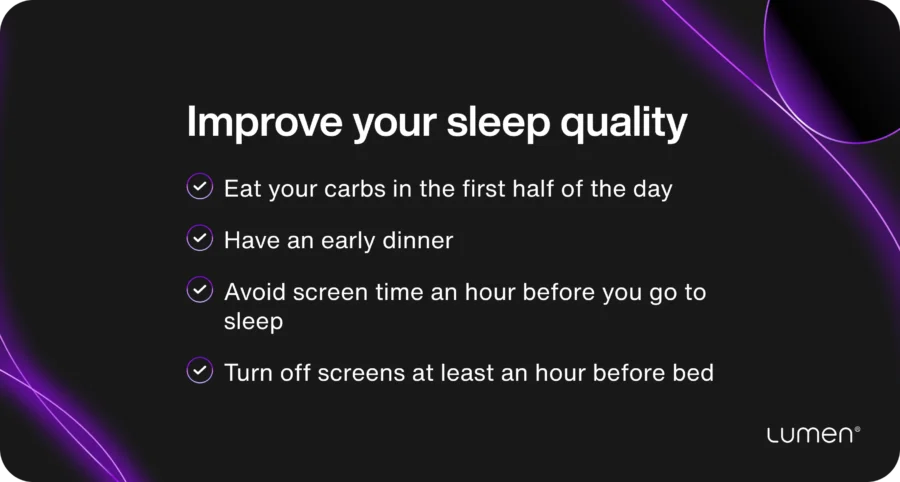7 proven ways to help boost your metabolism

What are the benefits of boosting your metabolism?
Most people think metabolism only affects weight loss, but it’s responsible for so much more than that. It’s about helping your entire body to function at its best. A healthy metabolism regulates body temperature, hormone production, immune health, and even brain function.
However, a staggering number of people – 88% of Americans and 1 in 3 UK adults – are metabolically unhealthy. This means their bodies aren’t processing energy efficiently, which can lead to issues like insulin resistance and a higher risk of chronic diseases like type 2 diabetes.
Improving your metabolic health offers a wide range of benefits that include:
- Easier weight loss
- Increased energy levels
- Better sleep
- Improved fitness performance
- Reduced risk of cardiovascular disease
- Improved cognitive function
Read on to learn more about the benefits of improving your metabolic health, along with seven expert-backed strategies for doing so.

7 strategies to boost your metabolism
From building muscle to fueling your body with the right nutrients, here are our top pointers to help you get started:
Strategy #1: Balance your macros
Consume all three macros – carbs, fats, and protein – for optimal nutrition and blood sugar balance. If you’re starting out, track your macros to get an idea of how much you eat from each macronutrient to ensure a balance.
Protein is essential for satiety and blood sugar regulation. It helps keep hunger at bay by decreasing the amount of the hunger hormone ghrelin. It also boosts the levels of peptide YY, a hormone that makes you feel full [1, 2]. Add healthy fats to your protein for increased satiety. If you eat lean cuts of fish, steak, or poultry, pair them with healthy fats like nuts, seeds, avocado, coconut oil, or butter.
Carbs are important for energy production, but consuming more carbs than our activities require can cause a glycogen overload, leading the body to store the excess as fat. Our mitochondria’s effort to handle all this glucose also creates oxidative stress, which hurts mitochondrial health.
Moreover, when you consistently consume large amounts of refined carbohydrates and sugars, your blood sugar levels can remain elevated, leading to insulin resistance over time. If your cells can’t effectively absorb glucose, it will impair energy production and make it harder for your mitochondria to use glucose for energy when needed. As a result, you’ll be more likely to experience fatigue, cravings, and even weight gain.
So, what should you include in a metabolically healthy diet? Start with these whole foods to boost your metabolism:
- Complex carbohydrates like whole grains and fruits
- Non-starchy vegetables like leafy greens, broccoli, and bell peppers
- Lean protein sources like chicken, fish, legumes, and tofu
- Healthy fats like avocados, nuts, seeds, and olive oil
These foods provide sustained energy and stabilize blood sugar levels, promoting insulin sensitivity.

Lumen breath insight
Your pre-meal breath can reveal your current glycogen levels, helping you figure out how many carbs to eat at your next meal.
Glycogen levels depend on your carb intake and energy use. When glycogen is high, your mitochondria focus on burning carbs. If you eat more carbs than your glycogen stores can hold, the excess is stored as fat.
If you’re burning mostly carbs before a meal, your glycogen stores are likely full. Choose a low-carb meal with protein, healthy fats, and veggies to avoid glycogen overload and weight gain. If your pre-meal breath shows fat burn or a fat-carb mix, your glycogen stores aren’t full. You can eat carbs, if you’d like, without risking overload.
Take a post-meal breath 45–90 minutes after eating to see how your body responds to the meal. Your shift to carb burn may be sharp or gradual.
A major shift to carb burn means your mitochondria are getting glucose quickly.
You should see this when:
- Eating simple carbs that break down fast. This is fine occasionally, but consistently reaching Lumen level 5 and up for this reason can reduce your insulin sensitivity and lead to weight gain over time.
- Exercising before a meal. This makes cells more receptive to glucose uptake, which improves your metabolic health and prevents fat accumulation over time.
A gradual shift is generally healthier. It doesn’t overwhelm your mitochondria, reducing the risk of fat storage.
You should see this when:
Eating meals high in protein and fat and lower in carbs
Eating complex carbs that break down slowly, like brown rice or sweet potatoes
Strategy #2: Build up your muscle mass
Muscles are packed with mitochondria, the powerhouses of your cells, and house most of your glycogen, your body’s glucose storage. So, the more muscle you gain, the more mitochondria you’ll have. This translates to increased fat burn at rest, and a quick shift to carb burn when you need a boost.
You want to avoid breaking down muscle, which can result from working out at a high intensity while fasted, extreme calorie restriction, low protein intake, prolonged low-carb diets, and weight loss peptides. When you break down your muscle, the extra mitochondria go away with it. With less muscle and fewer mitochondria working together, this can lead to decreased fat burn and quicker weight gain from carbs.

Lumen breath insight
Take a pre-workout breath measurement to determine if you should fuel up before your high-intensity workout. If you’re burning fat, that’s a sign your glycogen stores are low, and you should eat a fast-digesting carbohydrate source like a banana to avoid muscle breakdown.
Take a metabolic measurement again 30–45 minutes following your workout, after your heart rate has stabilized. This measurement gauges how intense your exercise was and how well your body is recovering.
During high-intensity workouts like sprinting or weightlifting, your mitochondria rely on carbs for a quick and powerful energy boost. Afterward, your body enters a recovery phase, replenishing glycogen stores and repairing muscle tissue. During this time, it burns mostly carbs.
Once you’ve shifted to fat burn, it means recovery is complete. A longer shift back to fat burn means you had an intense workout.
Strategy #3: Improve your sleep habits
Did you know that disruptions to your circadian rhythm, the body’s internal clock that governs sleep-wake cycles, can negatively affect your metabolism? That’s because poor sleep impacts your mitochondria’s time for maintenance, repair, and reproduction, so they can produce the energy you need.
When you don’t get enough sleep, hormones that regulate metabolism and appetite can also become imbalanced. This can make it harder to lose weight, leave you feeling hungrier throughout the day, and even increase your risk of metabolic syndrome [3].

Luckily, there are simple ways to promote healthy sleep habits and support a healthy circadian rhythm. Our Lumen experts recommend the following:
- Avoid eating large or heavy meals close to bedtime: Give your body at least 2 hours to digest dinner before hitting the hay.
- Eat your carbs in the first half of the day to give your body time to shift to fat burn.
- Power down before bed: Turn off screens like phones and laptops at least an hour before bedtime.
- Cut back on caffeine: Aim to stop consuming caffeine at least six hours before bedtime and opt for caffeine-free alternatives like herbal tea later in the day.
Lumen breath insight
Healthy mitochondria burn fat at rest and while fasting, which is why we aim to wake up in fat-burn mode. Waking up in carb burn can be due to a few reasons related to your lifestyle, such as late-night eating, not getting enough sleep, and stress.
Measure your metabolism before bed to see where you stand, and again in the morning to see if you’re in fat burn.
Waking up in fat burn is the goal. It’s a sign of balance between the four major areas of your lifestyle: nutrition, movement, sleep, and stress management.

Strategy #4: Reduce your stress levels
Chronic stress is often a hidden culprit behind weight gain and a slow metabolism. When you’re under stress, your body releases a hormone called cortisol. Cortisol is vital in the fight-or-flight response, but chronic stress can disrupt your metabolic health [4] because it overworks the mitochondria, damages their membranes, and reduces their lifespan. Chronic cortisol also makes you overdependent on carbs and blunts fat burn.
You can manage your stress and keep your cortisol in check by:
- Taking regular walks
- Meditating
- Doing activities you enjoy
- Cutting back on caffeine
- Eating foods rich in tryptophan, like salmon and nuts

Strategy #5: Be mindful of meal timing
When you eat can significantly affect how your body processes energy. Research shows that consuming meals earlier in the day, when your body is more insulin-sensitive, can lead to better metabolic outcomes compared to late-night eating [5].
Eating earlier can help prevent overnight blood sugar crashes that can wake you up. One study found that people who ate a larger breakfast and a smaller dinner lost more weight and had improved metabolic health markers [6].
Aim to keep dinner light and at least 2–3 hours before bedtime. This routine gives your mitochondria time to recover overnight and helps them shift to fat burn.Late-night eating can cause your mitochondria to burn carbs overnight instead of switching to fat burn, disrupting sleep [7]. Syncing your eating patterns with your body’s circadian rhythm can optimize metabolic processes [8] and promote weight management by encouraging your mitochondria to burn fat for fuel.
Strategy #6: Try out carb cycling
Carb cycling is a strategy where you alternate between high- and low-carbohydrate days to improve your body’s ability to switch between using carbs and fat for fuel.
High-carb days give your mitochondria the energy they need to power your workouts and replenish glycogen, the stored form of glucose in muscles and the liver. On low-carb days, your mitochondria rely on fat for fuel.
This approach can improve metabolic flexibility by teaching your body to adapt efficiently to different fuel sources [9].
Carb cycling is preferred over long-term low-carb or keto diets. Constantly tanking glycogen stores and relying on fat for energy can make your body less efficient at using carbs, leading to quick weight gain when you eat carbs. It can also cause you to break down muscle for energy during weightlifting and increase your rate of perceived exertion due to low energy.
Strategy #7: Personalize your intermittent fasts
Intermittent fasting (IF) involves alternating periods of eating and fasting, allowing your digestive system and mitochondria to rest and repair. Common approaches like the 16:8 method (16 hours fasting, 8 hours eating) can improve insulin sensitivity, lower inflammation, and promote fat-burning when practiced consistently [10], although it’s not recommended for everyone.
When intermittent fasting, the mitochondria shift from using glucose as a primary energy source in the fed state to glycogen, the storage form of carbs, and finally, stored body fat. This shift from carb to fat burn helps boost metabolic flexibility.
Lumen breath insight
Measure your metabolism to know when to break your fast. Begin by measuring your metabolism when you first wake up to establish a baseline and determine whether you’re burning carbs or fats for fuel.
Continue measuring your metabolism every hour. The goal is to remain at level 1 or 2, which indicates fat burn. During a fast, your mitochondria should be burning fat for fuel.
When you shift towards carb burn (level 4 or 5), this indicates you should break your fast, as your glycogen stores are getting critically low and leading your body to break down muscle for energy.

Create new routines and track your progress
Here are a few habits you can implement:
- Reorganize your pantry to make healthy foods available
- Create space in your home to exercise and invite an accountability partner to join you
- Try meditation or breathwork once per day to help reduce your stress levels
- Practice mindful eating and pay attention to your body’s cues to avoid overeating
Seeing tangible results, such as weight loss, can be a major motivator when boosting your metabolism. However, instead of solely focusing on the scale, consider following your progress using a metabolism tracker to figure out how your body uses fats and carbs for fuel and how your metabolic health is improving over time.
This data can help you identify patterns and adjust your diet and routine to optimize your metabolism. Over time, these small, consistent changes can significantly improve your metabolic health.
Take your metabolic flexibility to new heights
Insights into how your body uses energy will empower you to make informed choices about your diet and lifestyle to experience increased energy levels, improved weight management, and a healthier you.
Understanding your metabolism is the first step to optimizing it, and we hope these strategies will help you on your journey to a metabolically healthy lifestyle.
Sources
[1] Blom, W. A., Lluch, A., Stafleu, A., Vinoy, S., Holst, J. J., Schaafsma, G., & Hendriks, H. F. (2006). Effect of a high-protein breakfast on the postprandial ghrelin response. The American journal of clinical nutrition, 83(2), 211–220. https://doi.org/10.1093/ajcn/83.2.211
[2] Batterham, R. L., Heffron, H., Kapoor, S., Chivers, J. E., Chandarana, K., Herzog, H., Le Roux, C. W., Thomas, E. L., Bell, J. D., & Withers, D. J. (2006). Critical role for peptide YY in protein-mediated satiation and body-weight regulation. Cell Metabolism, 4(3), 223–233. https://doi.org/10.1016/j.cmet.2006.08.001
[3] Kim, C. E., Shin, S., Lee, H.-W., Lim, J., Lee, J., Shin, A., & Kang, D. (2018). Association between sleep duration and metabolic syndrome: A cross-sectional study. BMC Public Health, 18(1). https://doi.org/10.1186/s12889-018-5557-8
[4] Garcez, A., Leite, H. M., Weiderpass, E., Paniz, V. M., Watte, G., Canuto, R., & Olinto, M. T. (2018). Basal cortisol levels and metabolic syndrome: A systematic review and meta-analysis of observational studies. Psychoneuroendocrinology, 95, 50–62. https://doi.org/10.1016/j.psyneuen.2018.05.023
[5] Davis, R., Rogers, M., Coates, A.M. et al. The Impact of Meal Timing on Risk of Weight Gain and Development of Obesity: a Review of the Current Evidence and Opportunities for Dietary Intervention. Curr Diab Rep 22, 147–155 (2022). https://doi.org/10.1007/s11892-022-01457-0
[6] Jakubowicz, D., Barnea, M., Wainstein, J., & Froy, O. (2013). High caloric intake at breakfast vs. dinner differentially influences weight loss of overweight and obese women. Obesity (Silver Spring, Md.), 21(12), 2504–2512. https://doi.org/10.1002/oby.20460
[7] Mantantzis, K., Campos, V., Darimont, C., & Martin, F. P. (2022). Effects of Dietary Carbohydrate Profile on Nocturnal Metabolism, Sleep, and Wellbeing: A Review. Frontiers in public health, 10, 931781. https://doi.org/10.3389/fpubh.2022.93178
[8] Luz, C. S. D. S., Fonseca, A. E. T. P. D., Santos, J. S., Araujo, J. F., Duarte, L. L., & Moreno, C. R. C. (2024). Association of Meal Timing with Sleep Quality and Anxiety According to Chronotype: A Study of University Students. Clocks & sleep, 6(1), 156–169. https://doi.org/10.3390/clockssleep6010011
[9] Goodpaster, B. H., & Sparks, L. M. (2017). Metabolic Flexibility in Health and Disease. Cell metabolism, 25(5), 1027–1036. https://doi.org/10.1016/j.cmet.2017.04.015
[10] Vasim, I., Majeed, C. N., & DeBoer, M. D. (2022). Intermittent Fasting and Metabolic Health. Nutrients, 14(3), 631. https://doi.org/10.3390/nu14030631







 Digital download
Digital download 


